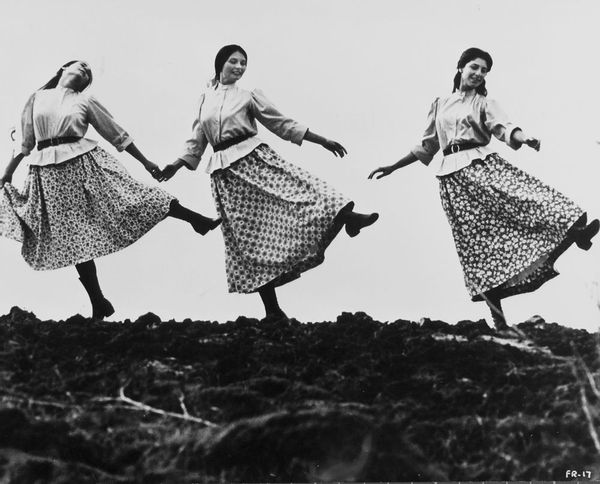
The great Sheldon Harnick, who died June 23 at 99, was a uniquely accomplished American lyricist. One of the few theater artists to have won not only a Tony Award and an Emmy Award, but also a Pulitzer Prize, Harnick is best known for his work as part of the creative team behind "Fiddler on the Roof." The first Broadway musical to surpass 3,000 performances, "Fiddler" was a centerpiece in the Jewish Pride movement that kicked off during the mid-1960s. It was matzo ball soup for the Yiddish soul.
In the early 1960s, the Jewish American soul was tied in knots ... Untangling that knot is how "Fiddler" managed to enthrall Jewish Americans.
While most pride movements fought internalized oppression through parades, art, fashion and music — think of James Brown's "Say It Loud–I'm Black and I'm Proud" and Helen Reddy's "I am Woman" — Jews in the '60s didn't hold Rosh Hashanah rallies or wear Passover pins. Instead, Jewish pride gave rise to popular entertainment: Mel Brooks' movies, Lenny Bruce's stand-up and "Fiddler on the Roof."
"Fiddler" was an instant hit, beloved on both stage and screen. In later years, Jewish studies professors have been less kind, complaining that Harnick's lyrics and Joseph Stein's book sentimentally sanitized the shtetl and misrepresented both Judaism and eastern European life. Their scholarly kvetches aren't wrong, technically, but they miss the point. "Fiddler" isn't a documentary, it's art. Harnick, Stein, and Jerry Bock, the show's composer, weren't trying to depict history. They were speaking to the heart of contemporary American Jewry.
In the early 1960s, the Jewish American soul was tied in knots. On the one hand, Jews knew they were outsiders. Less than two decades had passed since the liberation of Jews from Nazi death camps. The Rosenbergs' execution in 1953 still darkened their spirits, and the echoes of Joseph McCarthy's antisemitic committees still rang in their ears. Calling attention to their Jewishness, they feared, might trigger more antisemitism.
On the other hand, Jews were finally starting to get what their immigrant grandparents had worked so hard in sweatshops to achieve. Because so many Jews had enlisted to fight Hitler, they had qualified for the GI Bill, giving them access to higher education, better-paying jobs and nice houses in newly constructed suburbs. They were starting to fit in and be seen as real Americans, even though fitting in meant surrendering their differences, to some extent, and negating their identity as Jews.
Conspicuous consumption became a part of Jewish American life.
Untangling that knot is how "Fiddler," which debuted on Broadway in 1964, managed to enthrall Jewish Americans. Harnick's lyrics and the conflicts in Stein's plot mirrored the sources of tension that audience members brought into the theater. Jews, like others, were challenging social norms in the name of morality and freedom, but maintaining their identity as Jews required stability. "Fiddler" gave a legendarily one-word answer to the question of where that stability might come from: Tradition!
Not long after Jewish author Betty Friedan's "The Feminine Mystique" had launched second-wave feminism, Harnick introduced the shtetl of Anatevka and its quaint ways through a song about unequal gender roles. Papa "has the right as master of the house to have the final word at home," while Mama "must know the way to make a proper home, a quiet home, a kosher home," and "must raise a family and run the home, so papa's free to read the holy book."
Clearly, "Fiddler" seems to say, patriarchal traditions are unjust . . . but at the same time, they are stabilizing. "Without our traditions," the musical's protagonist Tevye says at the end of the song, "Our lives would be as shaky as . . . as a fiddler on the roof!"

Tevye, a lovable schlepper for whom nothing goes right, was a symbol for American Jews at the time. He wants safety and security, and for a poor man, that means money. 1964, when "Fiddler" premiered, was the year Saul Alinsky organized poor communities in Rochester, New York to fight against corporate power. From Clara Lemlich and the Jewish National Workers' Alliance through the rising counterculture in the 1960s, Jews were on the vanguard of attacking the wealthy's stranglehold on power.
Harnick's lyrics reflected this moral division within the Jewish community.
At the same time, "Fiddler" coincided with the Jewish exodus from tenements and sweatshops to suburban homes and professional opportunities. Some Jews had enough money to join country clubs, but couldn't because of antisemitic discrimination . . . so they built their own. Those were the Jews who could afford Broadway tickets. Conspicuous consumption became a part of Jewish American life.
"What would have been so terrible," Tevye asks God, "if I had a small fortune?" Harnick's lyrics for "If I Were a Rich Man" consist of a litany of things Tevye would indulge in, from a "big tall house with rooms by the dozen, right in the middle of the town" to the sacred desire to "discuss the holy books with the learned men, several hours every day." Meanwhile, suburban Jews were indulging, for the first time, in their own secular luxuries.

Though "Fiddler" begins with an embrace of rigid tradition, it's not long before romance finds new ways around it. One by one, Tevye's daughters escape their arranged marriages and wed men they love, radically defying established practices. While the Beatles sang "Can't Buy Me Love" outside the theater, inside it, Teyve's oldest daughter demanded to be allowed to marry Motl Komzoil, a poor tailor, rather than Lazar Wolf, the rich butcher she'd been promised to. When Tevye relents, Motl launches into "Miracle of Miracles," celebrating the fact that the butcher's money couldn't buy him love, along with the fact that:
Wonder of wonders, miracle of miracles,
God took the tailor by the hand,
Turned him around and, miracle of miracles,
Led him to the promised land!
The times were definitely a-changin', to paraphrase another Jewish songwriter, and many Jews embraced those changes. Others, however, found their newfound proximity to wealth and power intoxicating. They saw in the social structure, to quote another "Fiddler" classic, "something to think about, something to drink about, drink l'chaim, to life." Harnick's lyrics reflected this moral division within the Jewish community.
As contemporary as "Fiddler" was, many of Harnick's most familiar lines were actually taken word-for-word from Sholem Aleichem's "Tevye, the Dairyman." Aleichem was a turn-of-the-century Yiddish writer who was born in Eastern Europe in 1859 and died in New York City in 1916. Throughout his career, he never cared about wealth or status, which he considered shallow markers of American capitalism. All he wanted was to show that Jews could make art without sacrificing their Jewishness. He believed that Jews should be contributors to the great tapestry of intellectual achievement with threads of their own color and texture.
Although "Fiddler" deviated from Aleichem's true spirit — Harnick and Stein's story is Americanized and largely devoid of Yiddishkeit — the runaway success of their musical ultimately fulfilled Aleichem's goal. By setting Aleichem's words to Jerry Bock's Eastern European-inspired music, Harnick created a new mythological shtetl that Jews in America could be deeply proud of. "I belong in Anatevka," the musical closes, "Tumble-down, work-a-day Anatevka/ Dear little village, little town of mine."







